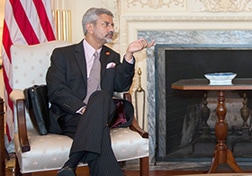
WASHINGTON - US President Donald Trump's administration has a very positive view of India and is interested in taking the relationship between the two countries forward, Indian Foreign Secretary S. Jaishankar said after meeting senior US officials here during which the issue of H1-B visas also came up. "We have a strong sense of optimism and the Trump administration has a strong sense of optimism," Jaishankar said at a media briefing...

here on Friday as he wrapped up three days of meetings with Trump administration officials. "The sense was certainly -- We like to do more with India," he said. "We saw a lot of goodwill and interest in taking this relationship forward," he added. In a visit designed to get acquainted with the new power structure as it re-evaluates US relations with other nations and sets its foreign policy objective, Jaishankar met Secretary of State Rex Tillerson, Commerce Secretary Wilbur Ross, Secretary of Homeland Security General John Kelly, and National Security Advisor General H.R. McMaster.
He said that the discussions were wide-ranging, while they focused on specific areas like foreign, regional and strategic issues, commerce and security in the individual meetings with each official.
The contentious topic of H1-B visas -- the temporary work permits for people with special qualifications -- also came up in the talks, he said. Jaishankar said that H1-B visas should be considered a trade and services issue and not purely an immigration issue. "It (H1-B issue) came on all our Congressional meetings and essentially what we conveyed was that the H1-B was a category of trade and services which actually helps the American economy to be more competitive and if the Trump administration intention is to bring back American companies to America and attract more foreign investment in America, in the near term then it would be important that the growing America remain competitive," he said.
"So there will be a growing need for this partnership. I think that was a point which was registered, that H1B in many ways is an economic issue, a trade business issue." Jaishankar acknowledged that Trump's administration had a new perspective on the world and that India had to "adapt to it and look at new possibilities".
But he noted that there has been a continuity in relations between New Delhi and Washington under the three previous administrations and the relationship grew and the new one sees India as a good, solid partner in many areas, including security, and there was convergence in foreign policy. Congress has been very supportive of growing relations with India, giving bilateral ties a stronger and wider base, he said. Building on that, Jaishankar said he met with leaders from both parties, among them Speaker Paul Ryan, House Minority Leader Nancy Pelosi, Senate Foreign Relations Committee Chairman Bob Corker and Senator Mark Warner, who is co-chair of the Senate India Caucus. Asked if China and Pakistan figured in the talks, he said that the talks with Tillerson and Kelly focused on the global and regional strategic situations and Afghanistan and terrorism came up.
He, however, added that it is for the US to decide on policies towards these countries.
He said that the discussions were wide-ranging, while they focused on specific areas like foreign, regional and strategic issues, commerce and security in the individual meetings with each official.
The contentious topic of H1-B visas -- the temporary work permits for people with special qualifications -- also came up in the talks, he said. Jaishankar said that H1-B visas should be considered a trade and services issue and not purely an immigration issue. "It (H1-B issue) came on all our Congressional meetings and essentially what we conveyed was that the H1-B was a category of trade and services which actually helps the American economy to be more competitive and if the Trump administration intention is to bring back American companies to America and attract more foreign investment in America, in the near term then it would be important that the growing America remain competitive," he said.
"So there will be a growing need for this partnership. I think that was a point which was registered, that H1B in many ways is an economic issue, a trade business issue." Jaishankar acknowledged that Trump's administration had a new perspective on the world and that India had to "adapt to it and look at new possibilities".
But he noted that there has been a continuity in relations between New Delhi and Washington under the three previous administrations and the relationship grew and the new one sees India as a good, solid partner in many areas, including security, and there was convergence in foreign policy. Congress has been very supportive of growing relations with India, giving bilateral ties a stronger and wider base, he said. Building on that, Jaishankar said he met with leaders from both parties, among them Speaker Paul Ryan, House Minority Leader Nancy Pelosi, Senate Foreign Relations Committee Chairman Bob Corker and Senator Mark Warner, who is co-chair of the Senate India Caucus. Asked if China and Pakistan figured in the talks, he said that the talks with Tillerson and Kelly focused on the global and regional strategic situations and Afghanistan and terrorism came up.
He, however, added that it is for the US to decide on policies towards these countries.

 RSS Feed
RSS Feed
